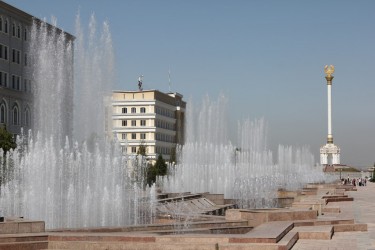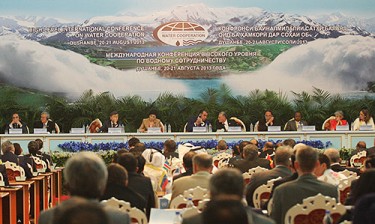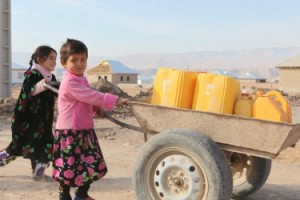An international conference on water cooperation ended in Dushanbe, the capital of Tajikistan, on August 21. More than 900 representatives from about 70 countries and organizations attended the conference. Yet the event has failed to impress Tajikistan’s social media users who believe that holding large conferences is less effective than doing tangible things to resolve water-related problems.
‘Empty statements’
The conference was latest in a string of international summits on water that Tajikistan has hosted over the recent years. As with previous events of this kind, endless discussions rather than concrete resolutions or agreements dominated the conference. EurasiaNet reports:
One Tajik participant told EurasiaNet.org that the discussions were “very trivial” and included “endless empty statements. Loads of money is being spent talking, but it’s like déjà vu,” he said, comparing the conference to past meetings on the same topic.
High-level International Conference on Water Cooperation, Dushanbe, 20-21 August 2013. Image by Flickr user ASIA-Plus, uploaded August 20, 2013, used with permission.
The failure of the conference to deliver tangible outcomes has not been lost on Tajikistani bloggers. Icekandar writes [ru] on LiveJournal:
В Таджикистане в очередной раз проводят международный саммит по водным проблемам. Все красиво и пышно: дорогие отели, делегатов встречают, развлекают, кормят и поют. А что нам от этих саммитов? Разве в нашей жизни что-то меняется? Из крана все так же порой течет коричневая вода. Во многих домах вода не поднимается выше второго этажа, и людям приходится устанавливать насосы, чтобы пользоваться водой. Это я говорю про столицу, а в сельской местности положение еще хуже. Во многих районах, особенно на юге, есть кишлаки, в которых чистой воды нет вообще. Дети и женщины в таких местах каждый день ходят за водой к ближайшему водопроводу или реке, используя тачки или ослов. Вода часто такого отвратительного качества, что дети болеют.
А мы все проводим международные саммиты вместо того, чтобы попытаться что-то исправить…
Tajikistan is holding yet another international summit on water. Everything is beautiful and pompous: expensive hotels; the delegates are met and entertained; they eat and drink. But what do we get from these summits? Does anything really change in our lives? The water we get at homes is still brown [dirty] at times. In many residential buildings people living above the first floor do not have water; they have to install pumps in order to have access to water. I am talking about the situation in the capital, while in rural areas the situation is even worse. Many districts, particularly in the country’s south, have villages that do not get any clean water at all. Children and women in such areas fetch water daily from the nearest water pipe or a river, using carts or donkeys. The water they bring home is often of such terrible quality that children become ill.
And we keep hosting international summits instead of trying to change things…
Under a news article about the conference, one reader asks [ru]:
Напишите что решили конкретно?.. Или собрали 1000 человек и только бла-бла-бла делали? Может быть хватит пустых разговоров?
What exactly did [the participants at the conference] agree on?.. Or have they just gathered 1,000 people and did blah-blah-blah? Maybe we’ve had enough of these empty talks?
What to do?
Amal Khanum Gadzhieva remarks [ru] sarcastically in her blog on ASIA-Plus that Tajikistan spends much money on international summits rather than spending them on projects to improve water supply in Dushanbe:
И мне очень стыдно, что я такая безграмотная, и, к тому же, эгоистка, более того, не патриотка! Вместо того, чтобы «Шукрона кунед!»- быть благодарной, не радуюсь тому, что на проведение Форума по чистой воде нашли миллионы, а чтобы поставить один фильтр на резервуар городской питьевой воды, не могут изыскать деньги больше двадцати лет!..
I am ashamed of being so uneducated and selfish and unpatriotic. Instead of [being thankful], I am not happy about the fact that they could find millions to spend on hosting the forum on fresh water, while over the last 20 years they have not been able to find money to equip the municipal water supply system with filters…
Commenting under a news report about the conference, Alik comes up [ru] with a suggestion on how Tajikistan’s water problems could be resolved:
Надо распродать дорогие авто чинушей и закупить на эти деньги трубы для населения, которое уже 20 лет без воды.
We should sell the expensive cars our officials are driving and use this money to buy water pipes for people who have lived without access to water over the last 20 years.

Water fountains in front of the National Library of Tajikistan. Image by Alexander Sodiqov, June 2013.
While Salimma, a Kazakhstani blogger visiting Dushanbe, suggests [ru] that people in Tajikistan should learn to use water more efficiently:
Представители Таджикистана рассказывали гостям со всего мира о том, как у них не хватает воды, как люди мучаются без доступа к питьевой воде и так далее. А ведь в самом Душанбе на каждом шагу фонтаны, переводящие тонны воды! Может вам просто научиться правильно и эффективно расходовать воду?
The representatives of Tajikistan [at the conference] were telling delegates from all over the world that they have shortages of water and that people suffer without access to drinking water. But in Dushanbe there are water fountains everywhere, using up tons of water! Perhaps you should simply learn to use water more efficiently?



